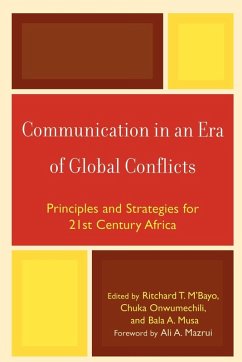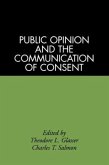Communication in an Era of Global Conflicts
Principles and Strategies for 21st Century Africa
Herausgeber: M'Bayo, Ritchard; Musa, Bala; Onwumechili, Chuka
Communication in an Era of Global Conflicts
Principles and Strategies for 21st Century Africa
Herausgeber: M'Bayo, Ritchard; Musa, Bala; Onwumechili, Chuka
- Broschiertes Buch
- Merkliste
- Auf die Merkliste
- Bewerten Bewerten
- Teilen
- Produkt teilen
- Produkterinnerung
- Produkterinnerung
Communication in an Era of Global Conflicts assesses trends and issues in communication and their implications for conflicts in the African context.
Andere Kunden interessierten sich auch für
![Libertarian Conflicts in Social Choice Libertarian Conflicts in Social Choice]() John L. WriglesworthLibertarian Conflicts in Social Choice28,99 €
John L. WriglesworthLibertarian Conflicts in Social Choice28,99 €![Folk belief for the control and well-being of socio-emotional conflicts between Hindu Muslim Sikh and Christian communities through traditional healing practices Folk belief for the control and well-being of socio-emotional conflicts between Hindu Muslim Sikh and Christian communities through traditional healing practices]() Charanjeet KaurFolk belief for the control and well-being of socio-emotional conflicts between Hindu Muslim Sikh and Christian communities through traditional healing practices59,99 €
Charanjeet KaurFolk belief for the control and well-being of socio-emotional conflicts between Hindu Muslim Sikh and Christian communities through traditional healing practices59,99 €![Affect, Interest and Political Entrepreneurs in Ethnic and Religious Conflicts Affect, Interest and Political Entrepreneurs in Ethnic and Religious Conflicts]() Affect, Interest and Political Entrepreneurs in Ethnic and Religious Conflicts43,99 €
Affect, Interest and Political Entrepreneurs in Ethnic and Religious Conflicts43,99 €![How to Know a Person How to Know a Person]() David BrooksHow to Know a Person28,99 €
David BrooksHow to Know a Person28,99 €![Gender Conflicts Gender Conflicts]() Gender Conflicts36,99 €
Gender Conflicts36,99 €![Culture and Communication Culture and Communication]() Edmund Ronald LeachCulture and Communication28,99 €
Edmund Ronald LeachCulture and Communication28,99 €![Public Opinion and the Communication of Consent Public Opinion and the Communication of Consent]() Public Opinion and the Communication of Consent64,99 €
Public Opinion and the Communication of Consent64,99 €-
-
Communication in an Era of Global Conflicts assesses trends and issues in communication and their implications for conflicts in the African context.
Hinweis: Dieser Artikel kann nur an eine deutsche Lieferadresse ausgeliefert werden.
Hinweis: Dieser Artikel kann nur an eine deutsche Lieferadresse ausgeliefert werden.
Produktdetails
- Produktdetails
- Verlag: University Press of America
- Seitenzahl: 410
- Erscheinungstermin: 22. Dezember 2008
- Englisch
- Abmessung: 229mm x 152mm x 24mm
- Gewicht: 663g
- ISBN-13: 9780761840947
- ISBN-10: 076184094X
- Artikelnr.: 25693278
- Herstellerkennzeichnung
- Libri GmbH
- Europaallee 1
- 36244 Bad Hersfeld
- gpsr@libri.de
- Verlag: University Press of America
- Seitenzahl: 410
- Erscheinungstermin: 22. Dezember 2008
- Englisch
- Abmessung: 229mm x 152mm x 24mm
- Gewicht: 663g
- ISBN-13: 9780761840947
- ISBN-10: 076184094X
- Artikelnr.: 25693278
- Herstellerkennzeichnung
- Libri GmbH
- Europaallee 1
- 36244 Bad Hersfeld
- gpsr@libri.de
Dr. Ritchard Tamba M'Bayo(Ph.D.) is Professor of Communication and Multimedia Studies at the American University of Nigeria. Dr. Chuka Onwumechili(Ph.D.) is Professor of Communication and Media Studies at Bowie State University. Mr. Bala A. Musa(Ph.D.) is Associate Professor of Communication Studies at Azusa Pacific University.
Part 1 PART I: THEORIES OF CONFLICT Chapter 2 1.Attribution, Psychodynamics
and Communication Behaviors of Conflict Actors Chapter 3 2.Media Messages,
Sins of Distortion and Signs of Wisdom Chapter 4 3.Agenda-Setting, African
Media and Conflict Chapter 5 4.Framing Theory and Conflict Transformation
in Rwanda and Bosnia Part 6 PART II: SYSTEMS PERSPECTIVES ON CONFLICT
Chapter 7 5. Professional and Organizational Influences on Conflict
Reporting Chapter 8 6.Media Messages, the Academy and the Internet Chapter
9 7.Global Media and Changing News Practices Chapter 10 8.Conflict,
Globalization, and the New World Information and Communication Order
Chapter 11 9.Threat Perceptions and Security in the West African Sub-region
Chapter 12 10.Virtual Communication and the Role of Diasporic Communities
in Conflict Mediation Part 13 PART III: CONFLICT STRATEGIES Chapter 14
11.Harnessing the Power of African Traditional and Modern Media Systems to
Avert Conflicts in Africa Chapter 15 12.Conflict Resolution in African
Folklore Chapter 16 13. The Press as Tools and Casualties of Political
Conflicts in Nigeria Chapter 17 14.Mass Media and the Establishment of
Peace as Path toSustainable Development in Africa Part 18 PART IV: AFRICA
IN AN ERA OF GLOBAL CONFLICTS Chapter 19 15.Mass Media and Ethnic Conflict
in West Africa Chapter 20 16.Social Conflict, Communication and Youth in
Tanzania Chapter 21 17.Negotiating the Thorny Road of Conflict as Nigeria
Opens its Communications Market to Private interests Chapter 22 18. Global
Media and the Replication of international Conflicts in Northern Nigeria
Chapter 23 19.Conflict and Ferment in International Communication Chapter
24 20.Multinational Corporations, Community Relations and the Niger Delta
Conflict Chapter 25 21. Poverty, Professionalism and the Challenges of
Democratization among Conflicted Print Media Journalists in Nigeria Chapter
26 22. Language of Conflict and the Coverage of Global Terrorism in Kenyan
Mass Media 1998-2005 Chapter 27 23.Managing Conflict in Nigeria through
Television
and Communication Behaviors of Conflict Actors Chapter 3 2.Media Messages,
Sins of Distortion and Signs of Wisdom Chapter 4 3.Agenda-Setting, African
Media and Conflict Chapter 5 4.Framing Theory and Conflict Transformation
in Rwanda and Bosnia Part 6 PART II: SYSTEMS PERSPECTIVES ON CONFLICT
Chapter 7 5. Professional and Organizational Influences on Conflict
Reporting Chapter 8 6.Media Messages, the Academy and the Internet Chapter
9 7.Global Media and Changing News Practices Chapter 10 8.Conflict,
Globalization, and the New World Information and Communication Order
Chapter 11 9.Threat Perceptions and Security in the West African Sub-region
Chapter 12 10.Virtual Communication and the Role of Diasporic Communities
in Conflict Mediation Part 13 PART III: CONFLICT STRATEGIES Chapter 14
11.Harnessing the Power of African Traditional and Modern Media Systems to
Avert Conflicts in Africa Chapter 15 12.Conflict Resolution in African
Folklore Chapter 16 13. The Press as Tools and Casualties of Political
Conflicts in Nigeria Chapter 17 14.Mass Media and the Establishment of
Peace as Path toSustainable Development in Africa Part 18 PART IV: AFRICA
IN AN ERA OF GLOBAL CONFLICTS Chapter 19 15.Mass Media and Ethnic Conflict
in West Africa Chapter 20 16.Social Conflict, Communication and Youth in
Tanzania Chapter 21 17.Negotiating the Thorny Road of Conflict as Nigeria
Opens its Communications Market to Private interests Chapter 22 18. Global
Media and the Replication of international Conflicts in Northern Nigeria
Chapter 23 19.Conflict and Ferment in International Communication Chapter
24 20.Multinational Corporations, Community Relations and the Niger Delta
Conflict Chapter 25 21. Poverty, Professionalism and the Challenges of
Democratization among Conflicted Print Media Journalists in Nigeria Chapter
26 22. Language of Conflict and the Coverage of Global Terrorism in Kenyan
Mass Media 1998-2005 Chapter 27 23.Managing Conflict in Nigeria through
Television
Part 1 PART I: THEORIES OF CONFLICT Chapter 2 1.Attribution, Psychodynamics
and Communication Behaviors of Conflict Actors Chapter 3 2.Media Messages,
Sins of Distortion and Signs of Wisdom Chapter 4 3.Agenda-Setting, African
Media and Conflict Chapter 5 4.Framing Theory and Conflict Transformation
in Rwanda and Bosnia Part 6 PART II: SYSTEMS PERSPECTIVES ON CONFLICT
Chapter 7 5. Professional and Organizational Influences on Conflict
Reporting Chapter 8 6.Media Messages, the Academy and the Internet Chapter
9 7.Global Media and Changing News Practices Chapter 10 8.Conflict,
Globalization, and the New World Information and Communication Order
Chapter 11 9.Threat Perceptions and Security in the West African Sub-region
Chapter 12 10.Virtual Communication and the Role of Diasporic Communities
in Conflict Mediation Part 13 PART III: CONFLICT STRATEGIES Chapter 14
11.Harnessing the Power of African Traditional and Modern Media Systems to
Avert Conflicts in Africa Chapter 15 12.Conflict Resolution in African
Folklore Chapter 16 13. The Press as Tools and Casualties of Political
Conflicts in Nigeria Chapter 17 14.Mass Media and the Establishment of
Peace as Path toSustainable Development in Africa Part 18 PART IV: AFRICA
IN AN ERA OF GLOBAL CONFLICTS Chapter 19 15.Mass Media and Ethnic Conflict
in West Africa Chapter 20 16.Social Conflict, Communication and Youth in
Tanzania Chapter 21 17.Negotiating the Thorny Road of Conflict as Nigeria
Opens its Communications Market to Private interests Chapter 22 18. Global
Media and the Replication of international Conflicts in Northern Nigeria
Chapter 23 19.Conflict and Ferment in International Communication Chapter
24 20.Multinational Corporations, Community Relations and the Niger Delta
Conflict Chapter 25 21. Poverty, Professionalism and the Challenges of
Democratization among Conflicted Print Media Journalists in Nigeria Chapter
26 22. Language of Conflict and the Coverage of Global Terrorism in Kenyan
Mass Media 1998-2005 Chapter 27 23.Managing Conflict in Nigeria through
Television
and Communication Behaviors of Conflict Actors Chapter 3 2.Media Messages,
Sins of Distortion and Signs of Wisdom Chapter 4 3.Agenda-Setting, African
Media and Conflict Chapter 5 4.Framing Theory and Conflict Transformation
in Rwanda and Bosnia Part 6 PART II: SYSTEMS PERSPECTIVES ON CONFLICT
Chapter 7 5. Professional and Organizational Influences on Conflict
Reporting Chapter 8 6.Media Messages, the Academy and the Internet Chapter
9 7.Global Media and Changing News Practices Chapter 10 8.Conflict,
Globalization, and the New World Information and Communication Order
Chapter 11 9.Threat Perceptions and Security in the West African Sub-region
Chapter 12 10.Virtual Communication and the Role of Diasporic Communities
in Conflict Mediation Part 13 PART III: CONFLICT STRATEGIES Chapter 14
11.Harnessing the Power of African Traditional and Modern Media Systems to
Avert Conflicts in Africa Chapter 15 12.Conflict Resolution in African
Folklore Chapter 16 13. The Press as Tools and Casualties of Political
Conflicts in Nigeria Chapter 17 14.Mass Media and the Establishment of
Peace as Path toSustainable Development in Africa Part 18 PART IV: AFRICA
IN AN ERA OF GLOBAL CONFLICTS Chapter 19 15.Mass Media and Ethnic Conflict
in West Africa Chapter 20 16.Social Conflict, Communication and Youth in
Tanzania Chapter 21 17.Negotiating the Thorny Road of Conflict as Nigeria
Opens its Communications Market to Private interests Chapter 22 18. Global
Media and the Replication of international Conflicts in Northern Nigeria
Chapter 23 19.Conflict and Ferment in International Communication Chapter
24 20.Multinational Corporations, Community Relations and the Niger Delta
Conflict Chapter 25 21. Poverty, Professionalism and the Challenges of
Democratization among Conflicted Print Media Journalists in Nigeria Chapter
26 22. Language of Conflict and the Coverage of Global Terrorism in Kenyan
Mass Media 1998-2005 Chapter 27 23.Managing Conflict in Nigeria through
Television








